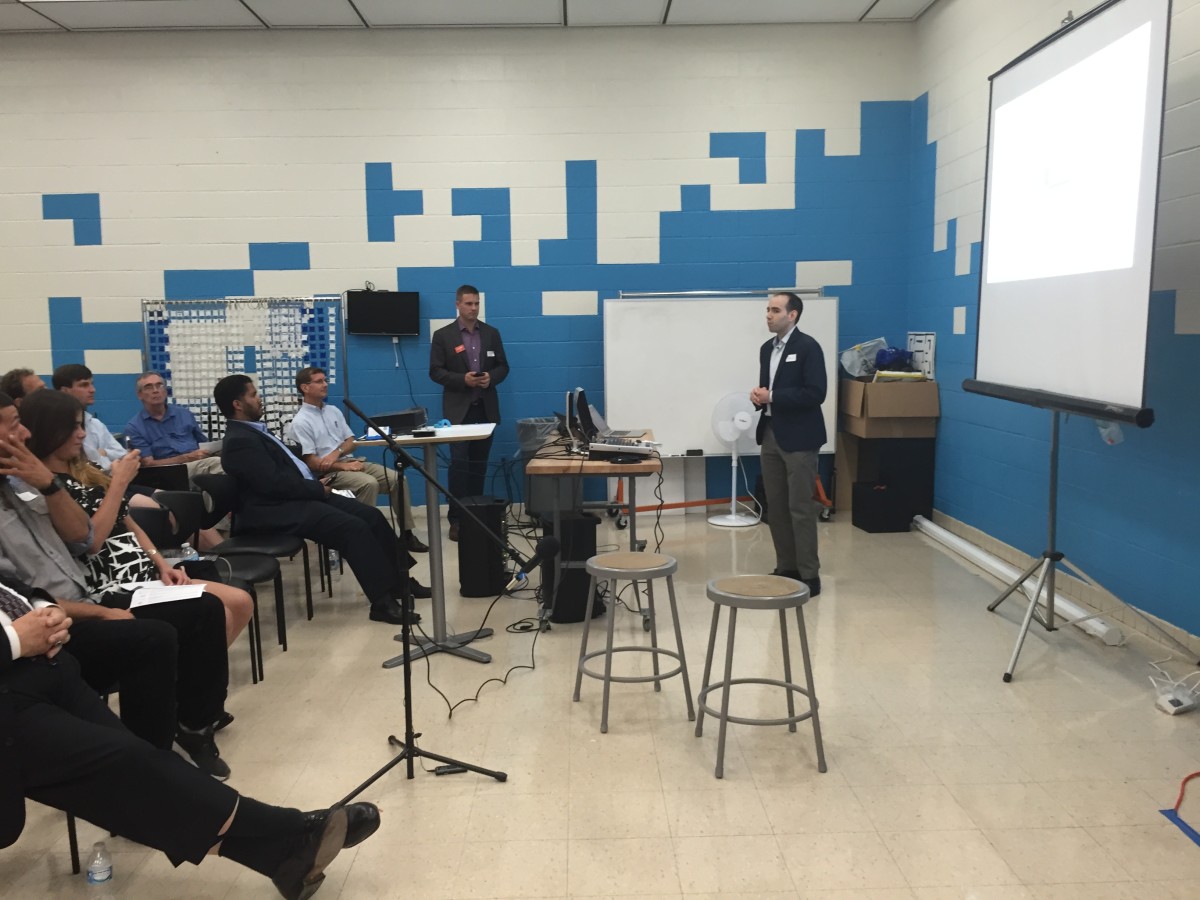The Digital Harbor Foundation’s Tech Center is usually buzzing with future innovators, but a group of startups who presented at an independent event last week were focused on the older generation.
The Baltimore chapter of Aging 2.0 gave the floor to startups who are focused on end-of-life care and aging in place.
While it may not be at the top of the list for 20-something startup founders, panelists who spoke before the pitches said the senior housing and care market is crying out for innovation.
They’re bolstered by U.S. Census Bureau stats that say the number of people over 65 is expected to double by 2050. Increasingly, that means the existing amount of senior housing won’t be enough, and the healthcare system won’t be able to keep up with demand.
“Where the action is,” said OberKaler attorney Howard Sollins, “It’s in funky senior housing apartments … that can help people age in place.”
That means not only rethinking physical space in terms of how seniors can get around their home and live comfortably, but also creating new ways for seniors to get access to healthcare, socialize and generally enjoy a positive quality of life.
LifeBridge Health Senior Vice President Brian White said that’s led the healthcare company to develop new strategies, such as creating smaller companies.
Registered Nurse Luz DiMarco founded the Hocha Foundation to encourage intergenerational learning. The nonprofit sends volunteers to talk to seniors, with the hopes of fostering intergenerational learning, and ensuring that elders aren’t forgotten. Finding ways to stay out of senior housing and hospitals could reduce isolation for seniors, she said.
“When you get admitted, that’s when you see the biggest decline,” DiMarco said.
Seven startup founders pitched companies that could help with each of these issues. Here’s a rundown of what they each do:
1. Luvozo
This D.C.-based startup built a robot to help care for seniors. Named Sam, the robot is designed to roam senior living communities helping patients with non-medical tasks and participate in activities. Sam wasn’t able to join founder David Pietrocola for the pitch, but that didn’t keep him from winning the pitch competition based on an audience vote.
2. AgeWell Biometrics
The startup uses wearables and sensors to detect risk of a person falling, said Joshua Wies. The app-based system alerts a person and healthcare professionals to potential risks of falls. The data can then be used to take action to prevent falls.
3. Quantified Care
This DreamIt Health Baltimore alum is creating an app that helps patients and caregivers communicate even when they don’t have an appointment. The patient can input vital signs, symptoms and other info, said founder Mike Batista.
4. Attendant
This New York-based startup is building a platform to help families make decisions after a family member passes away. The platform aggregates tasks for the family like funeral arrangements, death certificates and beyond.
5. Tutela Industries
This Clarksville-based startup seeks to improve bedside communication for people who are critically ill. The system tracks patient data in hopes of preventing readmission to hospitals.
6. Silver Sedans
The startup seeks to help people with Alzheimer’s socialize by providing ridesharing that helps patients meet up. Trips include shopping, day trips and doctors appointments, said cofounder Lisa Bass Cooper.
7. Senior Move Success
This company helps seniors move into assisted living or independent housing where they can age in place. Founder Caryl Siems said the company has 16 employees, and the company is founded on a commitment to understand senior’s needs. “Perhaps the most important thing we do is listen,” Siems said.
Before you go...
Please consider supporting Technical.ly to keep our independent journalism strong. Unlike most business-focused media outlets, we don’t have a paywall. Instead, we count on your personal and organizational support.
3 ways to support our work:- Contribute to the Journalism Fund. Charitable giving ensures our information remains free and accessible for residents to discover workforce programs and entrepreneurship pathways. This includes philanthropic grants and individual tax-deductible donations from readers like you.
- Use our Preferred Partners. Our directory of vetted providers offers high-quality recommendations for services our readers need, and each referral supports our journalism.
- Use our services. If you need entrepreneurs and tech leaders to buy your services, are seeking technologists to hire or want more professionals to know about your ecosystem, Technical.ly has the biggest and most engaged audience in the mid-Atlantic. We help companies tell their stories and answer big questions to meet and serve our community.
Join our growing Slack community
Join 5,000 tech professionals and entrepreneurs in our community Slack today!

The person charged in the UnitedHealthcare CEO shooting had a ton of tech connections

From rejection to innovation: How I built a tool to beat AI hiring algorithms at their own game

Where are the country’s most vibrant tech and startup communities?



